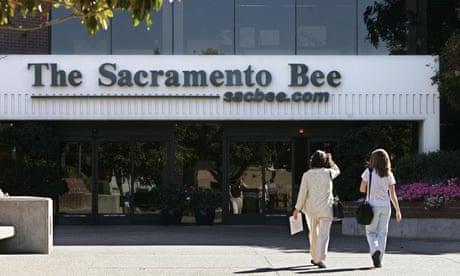American journalism is dying. Its survival requires public funds
Victor Pickard
Maintaining public media infrastructure should be non-negotiable for a democratic society. We have to be bold

The McClatchy newspaper chain’s recent filing for bankruptcy is one more data point showing that US journalism is dying. According to the US Bureau of Labor Statistics, the newspaper industry has lost more than 50% of its employees since 2001. While several big national papers like the New York Times are healthy, more typical are the closures, bankruptcies, and extreme downsizing that increasingly leave cities, towns and rural communities without local news.

McClatchy: newspaper publisher bankruptcy 'a loss for democracy', experts warn
Read more
This carnage has attracted opportunistic pathologies, from hedge funds buying up distressed papers and selling them for parts, to news outlets resorting to increasingly dubious forms of advertising and clickbait. A degraded product gives readers even less reason to support local news.
Advertisement
Meanwhile, little evidence suggests that any new market-driven model can rescue newspapers or sustain the journalism that democracy requires. For many areas across the US, there’s simply no commercial option. The market has failed us.
With market failure, journalism’s survival requires public options. We can glean ideas from our history and from around the world for how best to support the necessary public infrastructure that journalism – and our democracy – needs to survive.

Sign up to the Media Briefing: news for the news-makers
Read more
These policies include tax incentives that could transition struggling newspapers into not-for-profit status (as happened recently with the Salt Lake Tribune) and direct subsidies to create new digital startups, municipal newspapers and news cooperatives. Others hope that benevolent billionaires and philanthropists will save the day.
But tackling the journalism crisis at a systemic level – bringing sustenance to “news deserts” where rich benefactors and foundations are unlikely to go – requires a large public media fund. How do we create it?
Ideally, we’d massively increase federal support for public media. Whether we expand or replace the PBS model is an open question, but this new system must provide for information needs across all types of digital media and platforms.
Maintaining public media infrastructure should be non-negotiable for a democratic society. Short of paying directly out of the treasury, government could help facilitate multiple revenue streams into one large fund. Two objections typically arise: its cost and its relationship to government.
Advertisement
Regarding independence from government, opposition to public media is often ideological, not grounded in empirical evidence. An extensive record shows publicly-subsidized media existing comfortably in democratic countries around the world. Research suggests that public media often are no less critical of government than their private counterparts, and they correlate positively with strong democracies.
Given Americans’ fondness for it, invoking the BBC is useful to expand our political imagination for what’s possible
Even the US has long subsidized media infrastructure, from the postal system to the internet. Nonetheless, there are legitimate concerns about state capture – just as there are with commercial capture – and yet many democracies have figured out how to make this work. Safeguards and firewalls are both necessary and feasible.
The next question is how do we pay for it? Many options exist. We could raise funds from taxing platforms like Facebook and Google, placing levees on communication devices, and repurposing international broadcasting subsidies. Other sources include spectrum sales and individual tax vouchers. We could leverage already-existing public infrastructures such as post offices, libraries, and public broadcasting stations to provide spaces for local news production.
Advertisement
Major foundations could pool their money and help incubate a new public media system (as some did in the 1950s and 60s with US public broadcasting). Given Americans’ fondness for it, invoking the BBC is useful to expand our political imagination for what’s possible. But any new US system should be truly public – publicly owned and democratically governed with constant community input.
State governments should be doing more as well. New Jersey recently funded a “civic information consortium” to help provide local news. Such government funding could be paired with organizing community newsrooms and engaging residents during all stages of media production. This model might inspire a new kind of journalism.

Boris Johnson curbs photographers’ access to No 10
Read more
While large audiences won’t simply materialize overnight, local communities creating their own media may build trust and constituencies over time. Americans across the political spectrum care deeply about their local media – likely even more so if they’re directly invested in it.
All foundational democratic theories – including the first amendment itself – assume a functional press system. The fourth estate’s current collapse is a profound social problem. We desperately need a national conversation about what society should do about it. This crisis is also an opportunity to reimagine what journalism could and should be.
Ultimately, we face a stark choice: either we make public investments in journalism, or we accept a future in which entire regions and communities lack local news media. If we hope for any semblance of democracy, the correct path forward should be obvious.
Victor Pickard is an associate professor at the University of Pennsylvania’s Annenberg School for Communication. He is the author of Democracy Without Journalism? Confronting the Misinformation Society
You've read 8 articles...
... in the last four months, so we hope you will consider supporting our independent journalism today. More people, like you, are reading and supporting the Guardian’s independent, investigative journalism than ever before. Unlike many news organisations, we made the choice to keep our reporting open for all, regardless of where they live or what they can afford to pay.
The Guardian will engage with the most critical issues of our time – from the escalating climate catastrophe to widespread inequality to the influence of big tech on our lives. At a time when factual information is a necessity, we believe that each of us, around the world, deserves access to accurate reporting with integrity at its heart.
Our editorial independence means we set our own agenda and voice our own opinions. Guardian journalism is free from commercial and political bias and not influenced by billionaire owners or shareholders. This means we can give a voice to those less heard, explore where others turn away, and rigorously challenge those in power.
With your support we can keep delivering quality journalism that’s open and independent. Every reader contribution, however big or small, is so valuable. Support The Guardian from as little as £1 – and it only takes a minute. Thank you.
Support The Guardian









Post a Comment